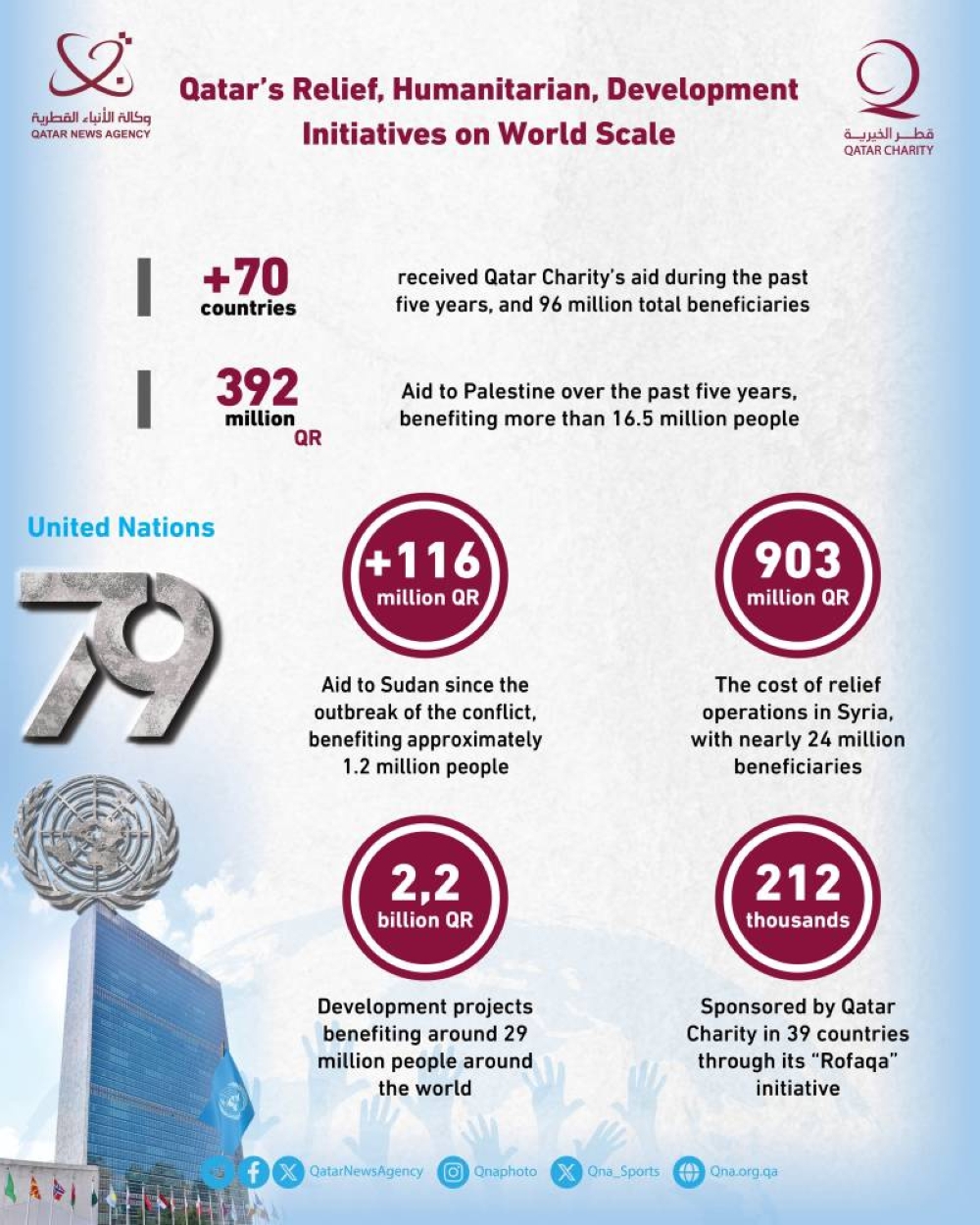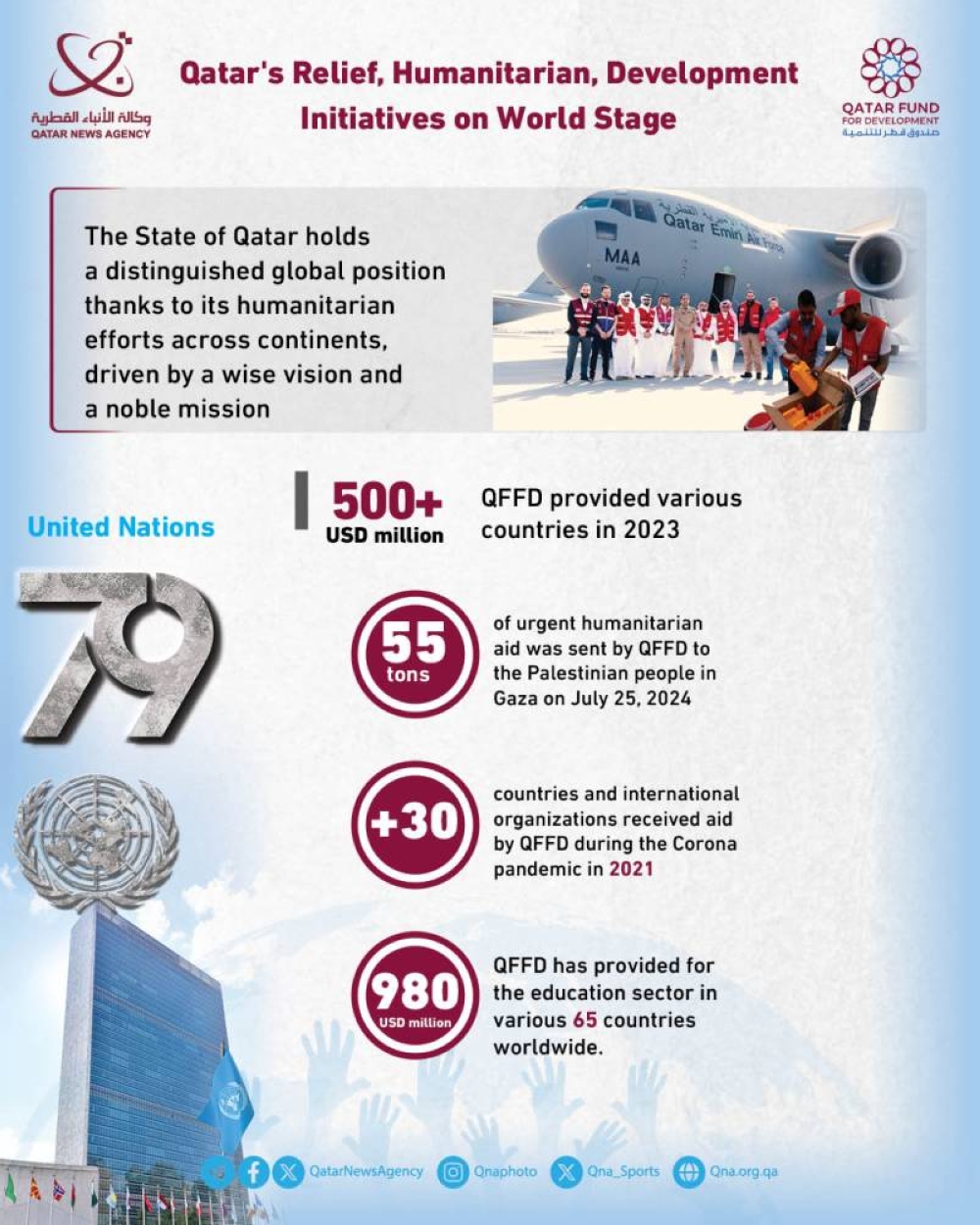

The State of Qatar holds a distinguished global position thanks to its humanitarian efforts across continents, driven by a wise vision and a noble mission aimed at developing communities affected by wars, disasters, and poverty. This contributes to strengthening international peace and security, especially in light of the escalating and unprecedented challenges facing the world.
Qatar consistently strives to harness all its resources to achieve the desired development goals in accordance with its National Vision 2030. It relies on multilateral cooperation as a means of coordinating efforts to address global issues.
This includes forming partnerships with United Nations agencies and international bodies, as well as local organizations that play a significant role in supporting and assisting the international community in addressing development challenges and humanitarian crises
.
The State of Qatar has initiated numerous relief, humanitarian, developmental, and educational projects that reflect its deep commitment to helping needy communities, particularly through contributions from Qatar Fund For Development (QFFD) and Qatar Charity, both of which are leading institutions in supporting humanitarian and developmental efforts.
In 2023, QFFD provided various countries with grants totaling to over half a billion dollars according to the funds website. The allocation included USD 95,787,309 for education, USD 51,288,045 for economic development projects, USD 53,749,100 for budget support, and USD 38,566,783 for healthcare projects, with other grants amounting to USD 4,865,961.
In response to the unprecedented humanitarian crisis in the Gaza Strip due to ongoing Israeli aggression since October 7, the State of Qatar has also played a significant role in providing humanitarian relief through various channels, including a QFFD donation of USD 25 million to the United Nations Relief and Works Agency for Palestine Refugees (UNRWA) on July 25, 2024, to support Palestinian refugees and the agency's activities regarding human development and humanitarian work in the region.
Moreover, on July 25, 2024, QFFD sent to the Palestinian people in Gaza seven trucks carrying 55 tons of urgent humanitarian aid including family tents, sanitation facilities, and hygiene products.
Qatar's role is not limited to providing aid, rather includes establishing development projects in various sectors both regionally and internationally. For instance, on July 24, 2024, QFFD signed an agreement with the Municipality of Tirana in Albania to build the Qatar Square in the capital.
The agreement seeks to build a public square that will span an area of 23,700 square meters, with a cost of EUR 11 million. It will include several facilities and different spaces for celebrations, exhibitions, and events, along with various shops and gathering areas, in addition to a water purification system for the Lido River in order to sustain natural irrigation water for the surrounding park that will be constructed as part of the project.
The project plans to achieve long-term developmental goals by providing a suitable environment for the construction of 25,000 housing units around the square and securing diverse job opportunities for Albanian citizens, which will positively contribute to supporting development and revitalizing the local job market by making this square an important center.
In Africa, a delegation from QFFD, Qatar Red Crescent Society (QRCS), and the International Committee of the Red Cross visited South Sudan to oversee humanitarian activities and distribute aid to Sudanese refugees and returnees from South Sudan from July 14 to 19.
The visit was an opportunity to evaluate the implementation of the agreement signed on February 18, 2024, between QFFD, QRCS, and the International Committee of the Red Cross, which allocated USD 2,344,420 to support affected refugees and returnees in South Sudan due to armed conflict in Sudan, severe flooding, and harsh weather conditions in South Sudan.
Since the projects implementation, 3,303 phone calls have successfully reunited separated Sudanese families, and 6,839 individuals received healthcare services, including 6,822 children. Additionally, 13,800 refugees and returnees (2,300 families) received urgent food assistance, and more than 24,000 people accessed clean drinking water.
During the COVID-19 pandemic, QFFD contributed a significant amount of aid to over 30 countries and international organizations, supporting efforts to ensure equitable vaccine access, particularly in the least developed countries.
The fund also provided over USD 140 million to multilateral health institutions and programs such as COVAX to develop and fairly distribute vaccines to over 92 developing countries.
Recognizing the importance of implementing the decisions of the UN Climate Change Conference in Glasgow (COP26) for least developed countries and small island developing states most vulnerable to climate change, QFFD mobilized support for these countries to implement resilient strategies to address the impacts of climate phenomena, natural disasters, and rising ocean levels.
Over the past decade, QFFD has provided USD 980 million for the education sector in various countries, benefiting millions of youths and children in 65 countries worldwide.
In 2022, the fund launched the "Women in Conflict Zones" initiative during an official event on the sidelines of the 77th UN General Assembly in New York to support women and girls in conflict and crisis contexts.
Through this initiative, QFFD, in collaboration with its strategic partners, aims to provide the necessary resources for women in conflict zones to become future leaders, peacemakers, and the founders of future generations.
When it comes to Qatar Charity, 96 million people worldwide benefited from its humanitarian interventions, development projects, and social care over the past five years, along with its international partnerships for 2023 and 2024.
In a report provided to the Qatar News Agency (QNA), Qatar Charity indicated that these projects were implemented in crisis and disaster-stricken areas and needy communities in over 70 countries thanks to Qatar Charitys field offices and its local and international partnerships.
Regarding its humanitarian interventions, Qatar Charity has provided QR 2.4 billion in relief and aid projects over the past five years, benefiting around 59 million affected people in more than 78 countries, including Syria, Palestine, Gaza Strip, Sudan, Jordan, Bosnia and Herzegovina, Somalia, Niger, Turkiye, Lebanon, and others.
Due to the emergency situation in Sudan since the outbreak of conflict in 2023, Qatar Charity provided humanitarian aid to displaced people in various areas, including food, shelter, medical supplies, and other assistance worth more than QR 116 million, benefiting approximately 1.2 million people.
Aid to Palestine amounted to around QR 392 million over the past five years, benefiting more than 16.5 million people.
The cost of relief operations in Syria so far stands at QR 903 million, with nearly 24 million beneficiaries.
Director of the Emergency and Relief Department at Qatar Charity Mana Al Ansari said that stemming from its sense of humanitarian duty, Qatar Charity is committed to intervening promptly and providing life-saving humanitarian aid to victims of natural disasters and crises worldwide in order to alleviate their suffering and help reduce their losses in property and infrastructure. He added that it does so through its field offices and in coordination with its partners, whether governmental, humanitarian organizations, or local partners. Qatar Charitys aid includes food, shelter, non-food items, health, water and sanitation, comprehensive relief, educational support, social cohesion, and livelihoods.
Moreover, Qatar Charity focuses on developing poor areas and communities, with its diverse development projects constituting a significant portion of its global operations, exceeded QR 2.2 billion over the past five years, benefiting around 29 million people.
Director of the Development Operations Department at Qatar Charity Abdulaziz Jassim Haji said that development projects are a priority for Qatar Charity due to its goal of making a difference in the lives of poor communities.
He noted that the rising number of natural disasters and crises in the region in recent years, including their prolonged nature, has not impacted the scale of Qatar Charity's developmental operations, focusing on quality and sustainable projects to create a lasting impact for beneficiaries.
Qatar Charitys development projects cover areas such as food security, economic empowerment, education, culture, social housing, healthcare, water, and mosques, in addition to its active role in social care since its inception. In fact, Qatar Charitys "Rofaqa" initiative currently sponsors 212,000 orphans, poor families, students, people with disabilities, and teachers across 39 countries on three continents: Asia, Africa, and Europe.
Qatar Charity could well be the largest organizations working with UN agencies in terms of funding and receiving funds within the context of GCC and Arab countries. In 2023 and 2024, it has signed more than 40 agreements with UN and international entities to implement relief and development projects worldwide. Among these UN and international partners are the UN High Commissioner for Refugees (UNHCR), the
International Organization for Migration (IOM), the World Food Programme (WFP), UNICEF, the Food and Agriculture Organization (FAO), the UN Office for the Coordination of Humanitarian Affairs (OCHA), as well as UNRWA and the World Health Organization.
Through these partnerships, Qatar Charity, either provides support to partner organizations for the implementation of development and relief projects or receives financial support from the UN agencies to carry out the projects. This underscores the trust these organizations place in Qatar Charity and its various projects executed around the world.
The initiative also reflects the State of Qatars ongoing commitment to supporting women in crises and empowering them to make effective positive changes in conflict-affected communities by involving them in the processes of establishing and maintaining international peace and security at all levels, enhancing their efforts to provide greater protection for women in conflict areas, and enabling women and girls to take on leadership roles in their communities by strengthening their decision-making skills and allowing them to contribute effectively within their communities
